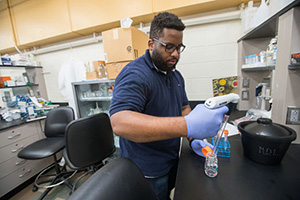The Graduate Program in Ecology, Evolution, and Organismal Biology is intended for highly qualified students who plan to pursue a career that includes research in the fields of ecology and environmental science, organismal biology, and/or evolutionary biology. Students work closely with a faculty member in the department to make a significant contribution to scholarship and research in their field, and to develop an individualized training program involving coursework and collaborative study.
 Students seeking a Ph.D. degree in Ecology, Evolution, and Organismal Biology at Brown choose an EEOB faculty advisor within their area of specialization. Students benefit from the wide range of interests of faculty members within the department, as well as from interactions with members of other programs and departments within the University, especially the graduate programs in Molecular and Cell Biology, Biochemistry, Physiology, Neuroscience, Applied Mathematics, Earth and Environmental Sciences, Engineering, and Computer Science.
Students seeking a Ph.D. degree in Ecology, Evolution, and Organismal Biology at Brown choose an EEOB faculty advisor within their area of specialization. Students benefit from the wide range of interests of faculty members within the department, as well as from interactions with members of other programs and departments within the University, especially the graduate programs in Molecular and Cell Biology, Biochemistry, Physiology, Neuroscience, Applied Mathematics, Earth and Environmental Sciences, Engineering, and Computer Science.
Independent research begins early in the graduate program, which is designed to prepare students for careers in higher education and research in either academic or non-academic settings. Each student develops a flexible course of preparation individually arranged to meet his or her specific needs. In addition to course work, students receive much of their training through seminars and colloquia. Seminars each semester address topics of particular interest to current graduate students, and weekly colloquia in each of the graduate programs on campus give students contact with visiting scientists from a wide variety of disciplines.
Admission to graduate study is usually open only to candidates for the Ph.D. degree. Brown undergraduates may apply to complete a 5th year masters degree, as described in the 5th Year Masters Guidelines.